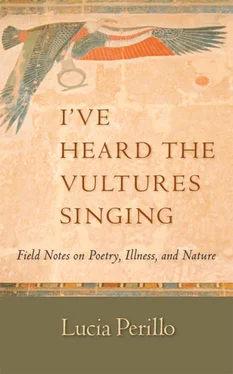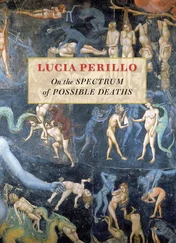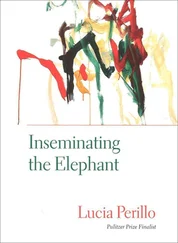As for Jim, whenever I ask him to fetch the ax he says it makes him think of his grandmother, about whom he remembers little but that she lived on toast and boiled potatoes, fed him chicken-loaf sandwiches, and wore shoes that had room for her big toes to air their bunions. Whenever I wake up with my leg-chopping complaints, he starts to wail the mantra she recited: Oh the pain, Jimke! Oh the pain, the pain!
· · · · ·
The poet Louise Glück traces the impulse to talk about subjects that are supposed to be forbidden back to Eve and her apple:
In the myth of the Garden, the forbidden exerts over the susceptible human mind irresistible allure. The force of this allure is absolute, final; the fact of it shapes, ever afterward, human character and the human vision of human destiny. The myth’s potency derives from the fact that there is no going back: exile and contamination occur once, the explicit descent which is the lovers’ punishment becomes a permanent burden or affliction. Which is to say: the myth is tragic.
Glück insists that tragedy means there is no going back, no rising above fate, and to tack onto tragedy some kind of ending that implies redemption falsifies the story — or at least rejects the story’s mythic dimension.
As a kid, I found original sin a particularly terrifying myth to be burdened with — though I admit to being turned on by the fact that Adam and Eve were naked. Their suffering left me puzzled, though: okay, they had to leave the Garden for a life spent wandering around dressed in leaves. Was that so bad? The way important details were left out drove me nuts. Like what the weather was like outside the Garden — was it cold, or did they lead the free-and-easy life of the muddy nudists at Woodstock?
Of course, the Old Testament’s most famous sufferer is Job — a righteous man subjected to a series of tests that result from a sinister collaboration between God and Satan. First his livestock die, then his house falls down, killing his ten children. That final tragedy whizzes by in just a few words, though, with God delivering a case of boils to Job for the coup de grâce. The tragic story fizzles, and the poem becomes a debate between Job and three friends who try to tell him why he shouldn’t wish for his own death. They don’t make much headway until at last God himself shows up in a whirlwind to tell Job to knock it off with the pity-party.
And Job caves in, first by going silent: “I put my hand on my mouth. / I have said too much already; / now I will speak no more.” Then God storms around some more from within his whirlwind, decorating his rant with beasts like the Leviathan, like cheesy special effects at the climax of a movie. When, at the end, Job is completely debased, he reiterates his willingness to hold his tongue: “Therefore I will be quiet, / comforted that I am dust.” (This translation, by Stephen Mitchell, softens the self-loathing of the King James Version, which goes: I abhor myself and repent in dust and ashes. )
Once Job agrees to quit whining, God gives him his wealth back, along with ten more children of the exact same gender-ratio as the first set, and these new children even seem to be an improvement on the original ones, judging by the fact that this time around we learn their names, at least the beautiful daughters’ names — Dove, Cinnamon, and Eye-Shadow, in Mitchell’s translation. The dead children disappear without a trace, and no one seems too broken up about it.
· · · · ·
The other day I tuned in to a documentary about the children who live in the area surrounding the Chernobyl nuclear plant, many of whom have grotesque birth defects. They were difficult to look at, and my first impulse was to flee by channel-surfing away, but I caught myself and said: What a poseur — you want to write about tragedy and you can’t even bring yourself to look , So I stuck it out with those kids, those whose heads were shaped like Bartlett pears and those whose brains grew in sacs outside their skulls. I would have liked to hear them speak about their lives, but they were not capable of speech — their experience would remain off-limits to me. I could not enter their lives or bodies and look out from within them.
Sometimes I imagine I’m the one on TV and my friends are watching. (Do they think my life is tragic? ) This mental exercise will only lead to trouble. Better to stay inside the dwindling brain than to indulge in the thought-experiment of entering another brain and taking a glance at the self, although it might be more socially acceptable for someone else to write about me than for me to write about myself, as I’m doing here, what with the good taste/unspeakability problem that arises when a life marked by what are seen conventionally as tragic parameters (pain, debility, blah-blah, death) is described from within.
You might argue: Whoa, don’t try to tell me I haven’t seen people blabbering about their body-troubles . . say on the kind of TV talk shows where the sufferer might win a car! But of course this is spectacle, the outside view. Also, on this talk-TV where people bare themselves, the only story that’s permissible is the one that ends with upward motion and not the slipping down. You can’t tell your story if it does not rise; good taste demands that the person who is stuck inside disease withdraw from public view.
We do have a few accounts — Willem de Kooning’s last paintings, made during his prolific dementia. Or Jean-Dominique Bauby’s memoir, The Diving Bell and the Butterfly , written after a stroke left him with “locked-in syndrome”—he dictated the book by blinking his left eye. Or there’s even this report from Emerson’s old age: “I have lost my mental faculties but am perfectly well.”
· · · · ·
Our longstanding authority on the subject of tragedy is Aristotle, who wrote about the subject in his Poetics. What tragedy does to its audience, he says, is arouse pity and fear , so that the audience gets to experience these emotions in a contained sort of setting — presumably as an alternative to experiencing them as they normally do, in life itself. People went to the ancient plays with their downward-skidding plots in order to purge their minds of imagining that this sort of future lay in waiting for themselves.
Aristotle does not talk about what happened when the audience went home and still found maybe Pa, maybe Junior, dying in a back room, as must have often been the case. Art can perform the service of catharsis, but it can’t cure a body or whisk it away, and the best the play could hope to do was to leave people better steeled for the loved one’s demise. There in the theater, though, a person is allowed to do the un-useful thing and fall apart, and other people in the audience are sure to be weeping too. So no one needs to feel absurd about losing his or her mind for a little while.
(In the early days of my disease, I suspected my friends of presenting a false front if they weren’t willing to go a little crazy with me. I wanted us to get crazed and drunk and beat our breasts and rip our tunics and rage and weep, which is what the ancient poets tell us to do if we are to respond to bad news in authentic manner. But lately I’m less inclined to that kind of falling-apart. When faced with a crisis like grief over the fallen house, the kind of person you want hanging around is someone who is handy with a hammer, somebody like the manic-whirlwind energetic God who knows how to get the house rebuilt.)
One essential aspect to a successful tragic plot, according to Aristotle — and this is art I’m talking about, I need to maintain the distinction between tragedy in art and tragedy in life, a distinction oddly smudged in many scholarly discussions of the subject — is that it should be quick, or quickish: the action “endeavors to keep as far as possible within a single circuit of the sun, or something near that.” It also should be complete in itself, a whole that has a beginning, middle, and end. “Beauty is a matter of size and order, and therefore impossible either (1) in a very minute creature, since our perception becomes indistinct as it approaches instantaneity, or (2) in a creature of vast size — one, say, a thousand miles long — as in that case, instead of the object being seen all at once, the unity and wholeness of it is lost to the beholder.”
Читать дальше











![Various - Birds and Nature, Vol. 12 No. 5 [December 1902]](/books/745517/various-birds-and-nature-vol-12-no-5-december-thumb.webp)
![Various - Birds and Nature Vol. 11 No. 2 [February 1902]](/books/745533/various-birds-and-nature-vol-11-no-2-february-1-thumb.webp)